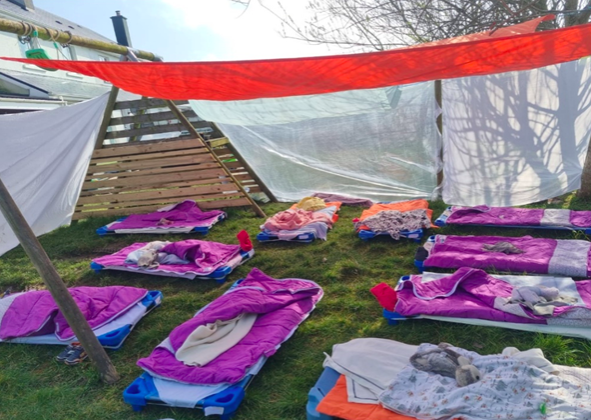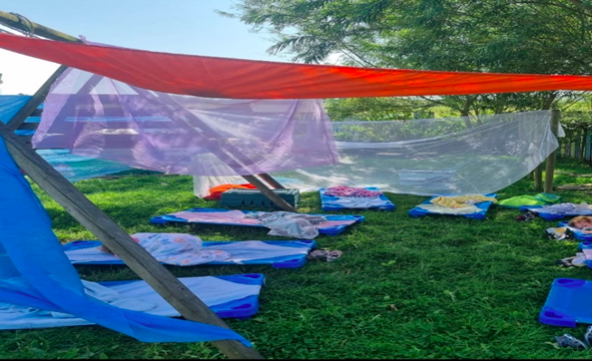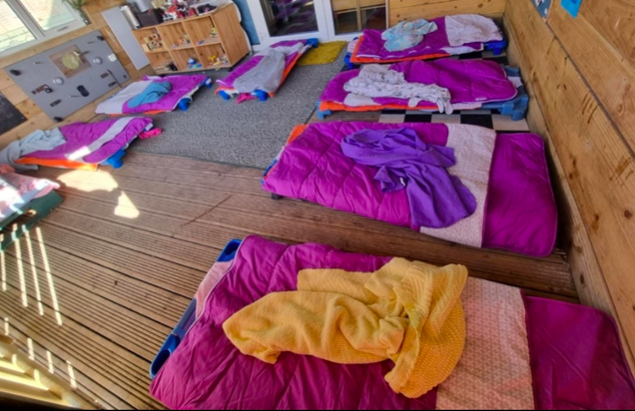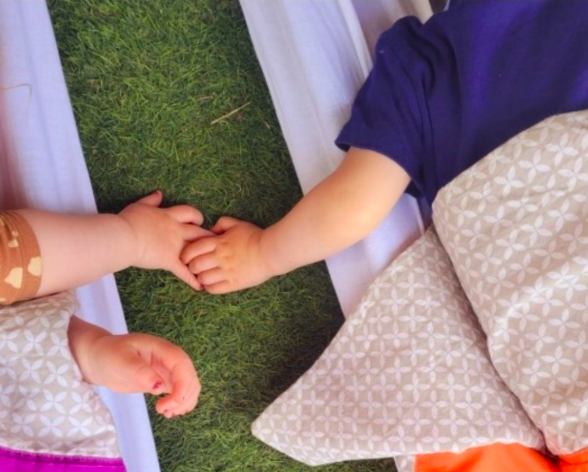Lorraine Flaherty is a passionate and experienced early years practitioner from Galway who is upskilling and pushing her knowledge to new levels by gaining her BA (Hons) in Early Childhood Care & Education at Portobello Institute.
Inspired by outdoor sleep practices in Scandinavian countries, Lorraine is researching outdoor sleeping for babies and toddlers. She explains where her interest in this came from.
“I have been very interested in the Scandinavian early years practices and outdoor sleeping. During Covid, we had been exploring the outdoors a lot more to reduce the spread of infection. So that encouraged me to implement outdoor sleeping for babies and toddlers.
“During the summer of 2021, I set up a canopy for the children to shade them from the sun, it was the perfect space for children to sleep as extra shade was added using sheets to block out the sun, allowing the children to get enough fresh air and listening to the sound of nature as they slept.
“At my setting, we have an outdoor classroom which provides shelter for children if it is raining. A risk assessment was carried out before setting up a sleep arrangement to ensure it was safe for children,” she said.
Lorraine explains that a child fell asleep in her arms one day and because they were already spending so much time outdoors, she was inspired to set up an outdoor sleeping area, this was supported by her manager and approved by Tusla.

How Does Outdoor Play and Outdoor Sleep Benefit Young Children?
"In my setting babies and toddlers explore the outdoors approximately six to seven hours a day, so children are used to exploring the outdoors. Children sometimes have lunch outside and once children see the beds set up they remove wet gear, wellies, and shoes and are ready for sleep/rest.
"There are several benefits for children sleeping outside such as:
- Better Sleep: The air helps the children sleep better, deeper and longer.
- Less Illness: Children who sleep outside spend less time in dry, recycled air, which can allow flu, virus and common cold to spread to children easily.
- Improved Learning: As children sleep outside they sleep longer and more serenely when outside. They are more refreshed, rejuvenated and ready to learn.
- Sense of Calm: By spending time in nature, looking at beauty and smelling, children who sleep outdoors benefit from nature's calming effect like swaying of branches, looking at the clouds in the sky and feeling fresh air.
- Healthy Habits: Spending lots of time outdoors from a young age, children can internalise these habits early on in their lives which can help them become healthier adults.
- Better Physical and Emotional Development: Outside sleeping can increase children’s brain, bone and muscular development and their social and emotional well-being.
"Since carrying out outdoor sleeping for the last couple of years I have noticed that children did sleep longer between 1 ½ hours to 2 hours, they were rarely sick and more energised as they slept surrounded by fresh air and nature.
"I like how children in the Scandinavian countries explore and engage with the natural environment such as forest schools in all-weather types. These countries have been carrying out outdoor sleeping practices all their lives as it is part of their culture, sleeping outdoors at -5 degrees," Lorraine explains.

Collaboration and Job-Shadowing with Danish Practitioners
"Our service is actively involved in the Erasmus Plus programme and this funding supports job shadowing opportunities between different European partners.
"My colleagues and I had the opportunity to visit three settings in Sweden in December 2023. We got to job shadow and learn about their curriculum, teachings and sharing of different ideas that we could incorporate in our own settings.
"I also got to see how children slept outdoors in -6 degrees wearing appropriate clothing and weatherproof bedding keeping them nice and warm in cold temperatures.
"We hosted a group of Danish educators in January 2024 who came over as part of the Erasmus Plus project and job shadowed over a three-day period where they got to see how we operate an outdoor setting in the Willows and Nursery.
"They got to experience how children in the nursery explored the outdoors in all weather types as they would like to encourage their children to explore more in all weather types.
"They all discussed that children sleep outside in strollers and have sheltered areas to cater for all weather types so children sleep outside all year round.
"It was a lovely experience having to share our culture and heritage sites around our community.
"We had different activities set up for the children and Danish practitioners engaged with the children throughout these activities. I engaged in conversation about their outdoor practice, especially the sleeping arrangement.
"One of the practitioners explained that they have a big outdoor area with children sleeping in prams or strollers outside in a shaded area, I explained that we can’t do that in Ireland due to regulations but that they can sleep in toddlers' beds or cots.
"The only difference is babies sleep in strollers in Scandinavian countries whereas children have to sleep in cots and toddler beds due to Irish regulations.
"Children have suitable bedding such as blankets and sleeping bags for different weather types such as sun and wind. Children are monitored at all times as they sleep, taking notes of body temperature and position of sleeping.
"In our service, we have developed risk assessments for outdoor sleeping in accordance with Tusla guidelines and have shared risk assessments with colleagues and parents," she said.

What are the Challenges with Outdoor Sleeping?
"The weather plays a big factor in children sleeping in the outdoors. Early spring, summer and late autumn are the main times during the year for children to sleep outdoors but this all depends on the weather.
"The winter months are hard to predict as wind, rain, and storms affect children sleeping in the outdoors.
"The weather in Ireland is so unpredictable. We are lucky to have an outdoor classroom for children to sleep in when it rains. However, the rain and wind can come into the outdoor classroom which results in the children having to sleep indoors," she said.
Positive Experiences and Developmental Outcomes of Outdoor Sleeping
"I feel it’s important not to take children up from their nap straight away when they wake as they need time to fully awaken.
"As children awake from their nap they don’t get up straight away or get upset, even when I or a colleague asks them if they want to get up they decide that are not ready yet so we let them rest some more as they listen to the sounds of nature around them.
"I encourage the children to explore the outdoors through all kinds of weather, children love and enjoy jumping in muddy puddles that are left by the rain, making ‘potions’ and mud pies in the mud kitchen which expands on children’s curiosity, creativity and imagination.
"Children sleep surrounded by nature as they hear the winds chiming and leaves rustling in the trees, feeling the warm breeze as they sleep and listening to the sound of birds singing and the sounds of lawnmowers cutting grass in the background.
"Another lovely moment that was experienced was two children sleeping side by side holding hands as they slept," she said.

Collaboration with Parents on Outdoor Sleeping
"Before carrying out outdoor sleeping for children I had sent questionnaires to parents explaining about the importance of children sleeping outdoors.
"There were answer options for parents to reply to such as yes or no to sleeping outdoors and an option for parents to give their comments or opinions.
"The responses to the questionnaires were very positive with the majority of parents giving yes votes. There were one or two parents who said no to outdoor sleeping due to a child being sick.
"The main reason why I wanted to complete my degree was so that I could carry out a research project on outdoor sleeping as I wanted to do more research into the topic and how it is carried out in Ireland and around the world," she said.
You can read more about Lorraine's experience of studying at Portobello Institute here.
If Lorraine’s story has inspired you to pursue a topic of interest through research, you can reach out to our early years academic advisor Sarah Coyne today, book a 15-minute consultation call, email sarah.coyne@portobelloinstitute.com or call 01 892 0028 to start your educational journey with Portobello Institute.
Portobello Institute’s Early Years department has qualifications ranging from level 5 to level 9. We offer:
- Certificate in Early Learning & Care – QQI Level 5 Major Award
- Advanced Certificate in Early Learning & Care – QQI Level 6 Major Award
- BA (Ord) Early Childhood Care & Education (level 7)
- BA (Hons) Early Childhood Studies (level 8)
- MA Early Childhood Studies
Other courses you may be interested in include:
- BA (Ord) Inclusive Ed Practice (level 7)
- BA (Hons) Inclusive Education Practice (level 8)
- MA Inclusive Education and SEN
Visit our Early Years department for more.
Read More: Play Supporting Young Children’s Introduction to Science Concepts



.png?width=1200&name=Feature%20image%20(68).png)

-3.png?width=352&name=Untitled%20design%20(5)-3.png)